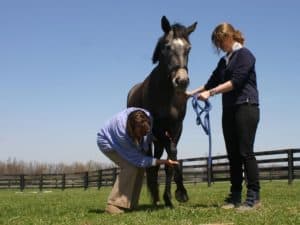Horse Vets Say: Hold the Persimmons, Please (AAEP 2009)
Persimmons are tropical, bright orange fruits that are claimed to have many health benefits in humans, from helping prevent cancer to arresting the hiccups. However, they have a dark side–they can form hard “concretions,” or fiber masses, in the gastrointestinal tracts of horses and humans that can require surgery to remove.
Such masses, termed bezoars, are even harder
- Topics: Article
Persimmons are bright orange tropical fruits that are claimed to have many health benefits in humans, from helping prevent cancer to arresting the hiccups. However, they have a dark side–they can form hard "concretions," or fiber masses, in the gastrointestinal tracts of horses and humans that can require surgery to remove.
Such masses, termed bezoars, are even harder in texture and more difficult to resolve when they are made of persimmon bits compared to other materials. They've even earned their own special name: Diospyrobezoars.
At the 2009 American Association of Equine Practitioners Convention, held Dec. 5-9 in Las Vegas, Nev., one presenter discussed the outcomes of 13 cases referred to five different university hospitals from 2001-2008 for diospyrobezoar-related problems. Heidi Banse, DVM, resident in veterinary clinical sciences at Oklahoma State University, reported that all horses exhibited colic, weight loss, or diarrhea. Ten of them presented in fall or early winter.
Of the 13 cases, 12 were treated and eight survived at least four months after treatment. Seven of those had bezoars in the stomach, with the remaining one in the intestines. Banse noted that in cases of stomach bezoars, medical treatment can take several weeks to work, but it is usually successful. Medical management consists of diet restriction (pelleted feed) and large amounts of Coca-Cola (yes, really) to help dissolve the bezoar
Create a free account with TheHorse.com to view this content.
TheHorse.com is home to thousands of free articles about horse health care. In order to access some of our exclusive free content, you must be signed into TheHorse.com.
Start your free account today!
Already have an account?
and continue reading.
Written by:
Christy M. West
Related Articles
Stay on top of the most recent Horse Health news with












